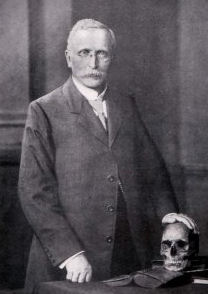 Entwicklungsmechaniker
Entwicklungsmechaniker
Wilhelm Roux wurde als Sohn des ehemaligen Universitäts-Fechtmeisters aus Jena am 9. Juni 1850 geboren. Seine Vorfahren waren adelige Hugenotten, die aufgrund des Edikts von Nantes (1687) aus Frankreich ausgewandert sind. Die Schulen absolvierte Wilhelm in Jena. 1870 schloss er die Oberrealschule ab.
Mit Ausnahme einer kurzen Unterbrechung während des Krieges (1970/71) studierte Roux Naturwissenschaften und – nachdem er das gymnasiale Abitur nachgeholt hatte – auch Medizin in Jena, Berlin und Strassburg.
Seine berühmtesten Lehrer waren Ernst Haeckel und Rudolf Virchow.
Im Winter 1876/77 bestand er das medizinische Staatsexamen, studierte aber noch ein Jahr Philosophie und arbeitete zugleich an seiner Dissertation „über die Verzweigungen der Blutgefässe“.
1878 und 1879 war er Assistent am pathologisch-chemischen (und zugleich hygienischen) Institut in Breslau, wo er sich 1880 abschloss.
Pionnier de l’embryologie expérimentale. Il détermina le développement d’un demi-embryon à partir d’un des deux blastomères issus de la division de l’œuf d’un amphibien, mettant en évidence un cas de développement en mosaïque, dont Driesch montra bientôt qu’il n’excluait pas la régulation, celle-ci se manifestant si on élimine le blastomère mort, ce que ne faisait pas Roux. Ce dernier joua un rôle déterminant dans le développement des recherches expérimentales sur ce qu’il appelait la «mécanique du développement» (Entwicklungsmechanik).
Roux, Wilhelm (1850-1924) German anatomist and zoologist who carried out research into developmental mechanics in embryology. He also investigated the mechanisms of functional adaptations, examining the physical stresses that cause bones, cartilage, and tendons to adapt to malformations and diseases.
Roux was born in Jena and studied there and at Berlin and Strasbourg. At Breslau (now Wroclaw in Poland) from 1879, he eventually became director of his own Institute of Embryology.
He was professor at Innsbruck, Austria, 1889-95, when he became director of the Anatomical Institute at Halle.
Roux’s embryological investigations were performed mainly on frogs‘ eggs. Puncturing the eggs at the two-cell stage of development (a technique Roux pioneered), he found that they grew into half-embryos: the fate of the parts had already been determined. He also researched into the earliest structures in amphibian development. Wilhelm Roux and August Weismann independently propose the germ plasm theory: The egg and sperm contribute chromosomes equally to the zygote (fertilized egg). The chromosomes are carriers of the hereditary potentials, and the germ cells (gametes) of the embryo are the only ones to carry the complete set of hereditary potentials (nuclear determinants), whereas each somatic (body) cell type contains only part of these potentials required for the specific cell type. 1888
Wilhelm Roux performs the first test of the germ plasm theory: Destruction of one cell of the 2-cell frog embryo with a hot needle results in development of a half-embryo, supporting mistakenly the Roux-Weismann theory.
Experimentally manipulated the environment of developing eggs and embryos to understand the processes occurring. In 1888, he killed one of the first two balstomeres of a frog’s egg with a hot needle, then watched the development of the developing cells. He reported that only half an embryo emerged. This conclusion was shown to be erroneous, however, by Driesch. German anatomist, a founder of experimental embryology. He was a pupil of Ernst Haeckel and a professor (1895–1921) at the Univ. of Halle. In his studies of the relationship of embryology to evolution he developed specialized research techniques that he called “developmental mechanics,” and in 1894 he founded as its organ the Archiv für Entwicklungsmechanik. 1850 am 9. Juni in Jena geboren
1878 Promotion in Jena
1880 habilitiert in Breslau (Wrociaw)
1881 Veröffentlichung „Der Kampf der Teile im Organismus“
1886 a. o. Professor in Breslau
1889 bis 1895 Ordinarius für Anatomie und Direktor des anatomischen Instituts an der Universität Innsbruck
1894 Gründung des „Archiv für Entwicklungsmechanik“
1913 Streitschrift „Über kausale und konditionale Weltanschauung und deren Stellung zur Entwicklungsmechanik“
1921 Emeritierung
1924 am 15. September in Halle gestorben

 Entwicklungsmechaniker
Entwicklungsmechaniker